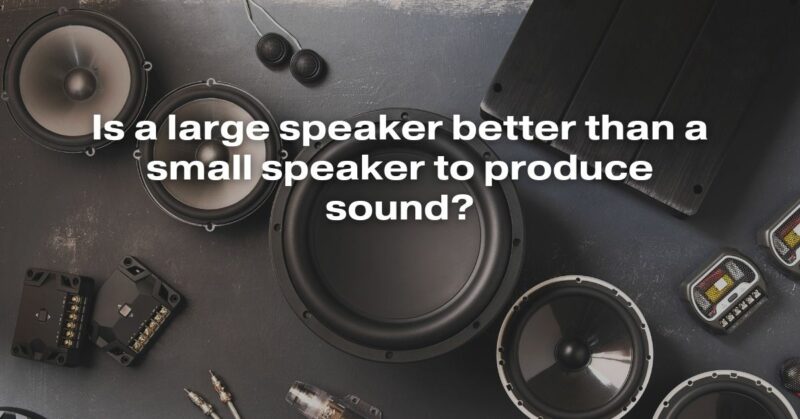When it comes to audio equipment, speakers play a crucial role in delivering the desired sound quality. One common debate in the world of audio enthusiasts revolves around the choice between large and small speakers. Is a large speaker better than a small speaker when it comes to producing sound? The answer to this question isn’t straightforward and depends on various factors. In this comprehensive article, we will explore the advantages and disadvantages of both large and small speakers, helping you make an informed decision when selecting the right speaker for your audio needs.
The Basics: Understanding Speaker Size
Before delving into the comparison, it’s essential to understand the basic principles of speaker size and its impact on sound production.
Large Speakers: The Pros and Cons
Pros:
- Enhanced Bass Response: One of the most significant advantages of large speakers is their ability to produce deep and powerful bass. The larger surface area of the diaphragm allows for more significant air displacement, resulting in richer low-frequency sound reproduction. This makes large speakers ideal for music genres like hip-hop, rock, and electronic music.
- High Volume Capability: Large speakers can generally handle higher wattage, which means they can produce louder sound without distortion. This makes them suitable for larger rooms or outdoor events where high volume levels are required.
- Extended Frequency Range: Large speakers often have a wider frequency range, enabling them to reproduce a broader spectrum of audio frequencies accurately. This contributes to a more immersive listening experience, especially for audiophiles.
Cons:
- Size and Portability: The most apparent drawback of large speakers is their size and weight. They are less portable and may not fit well in smaller spaces. Transporting them can be challenging, which limits their versatility.
- Cost: Generally, larger speakers tend to be more expensive than their smaller counterparts, making them less accessible to those on a tight budget.
Small Speakers: The Pros and Cons
Pros:
- Compact and Portable: Small speakers are ideal for those who value portability. They are lightweight and easy to carry, making them suitable for on-the-go use, such as picnics or travel.
- Space Efficiency: In smaller living spaces, compact speakers are a practical choice as they don’t take up much room. They can be discreetly placed on shelves or mounted on walls.
- Clarity in Mid and High Frequencies: Small speakers often excel in reproducing mid and high frequencies with precision. This makes them suitable for genres like classical music and jazz, where clarity and detail are paramount.
Cons:
- Limited Bass Response: The primary drawback of small speakers is their limited ability to produce deep bass. The smaller diaphragm size results in less air displacement, which can lead to a weaker bass response compared to larger speakers.
- Lower Maximum Volume: Small speakers may struggle to reach high volume levels without distortion. This can be a limitation in larger rooms or at outdoor gatherings where more significant sound projection is needed.
Choosing the Right Speaker: Factors to Consider
When deciding between large and small speakers, several factors should influence your choice:
- Intended Use: Consider where and how you plan to use the speakers. Large speakers are better suited for home theaters or parties, while small speakers are great for personal listening or small gatherings.
- Space Availability: Evaluate the available space in your room. Large speakers require more floor or wall space, while small speakers can fit into tight spots.
- Budget: Determine your budget, as large speakers tend to be pricier than small ones. Balance your audio requirements with your financial constraints.
- Preferred Music Genre: Consider the type of music you listen to most frequently. If you prioritize bass-heavy music, larger speakers may be the better choice.
- Portability: If you need a speaker for travel or outdoor activities, portability becomes crucial, favoring smaller options.
Conclusion
In the debate of whether a large speaker is better than a small speaker to produce sound, there is no definitive answer. The choice ultimately depends on your specific needs and preferences. Large speakers excel in bass response and high volume capabilities, making them ideal for certain genres and settings, but they can be cumbersome and costly. Small speakers, on the other hand, offer portability and space efficiency, with a focus on mid and high-frequency clarity, but they may lack in bass response and maximum volume.
To make an informed decision, carefully consider your intended use, available space, budget, preferred music genre, and the level of portability you require. Ultimately, the “better” speaker is the one that best suits your individual audio needs and complements your listening preferences. Whether large or small, a well-chosen speaker can significantly enhance your overall audio experience.


